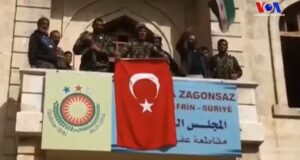By John Slinger – Senior Fellow.
26th September 2013, Human Rights and Conflict Resolution, Issue 3, No. 14.
The most important eight words in so-called ‘international law’ are in Article 3 of the United Nations Universal Declaration of Human Rights, which proclaims that all human beings are guaranteed ‘the right to life, liberty and security of person.’ Yet during two BBC audience debates that I participated in recently about whether intervention works in light of the 10th anniversary of Iraq, these eight words were not mentioned and there was only a cursory reference to human rights. The world has to decide whether, and if so, how it wishes to make these eight words a reality. To take out of context lyrics of the band Extreme, we need ‘more than words’. In recent years the world has chosen to dodge its responsibility to protect, to delay taking effective action, until far too many innocent deaths have occurred.
There were impassioned contributions about the stresses and strains placed on the British political system by the decision to intervene in Iraq, about how in 2003 the political class apparently ignored the views of a million protesters on British streets. It is rather depressing that those brave politicians and activists who campaigned against Saddam in the 1980s, such as my former boss Ann Clwyd MP, numbered only in the tens or hundreds, yet so many thousands marched against efforts taken to remove from power a vicious, fascistic dictator who had used WMDs against the Kurds and the Iranians and butchered hundreds of thousands of his own people. In the 1930s people joined the International Brigades to fight Franco’s fascism. Yet in the noughties and beyond, when a tweet can reach millions in the blink of an eye, when the suffering of hundreds of thousands reaches our eyes daily thanks to brave professional and citizen journalism, most people, albeit with the noblest of intentions, assume a position that allows the abuse to continue.
We in Britain and elsewhere express views from the fortunate perspective of a society which is secure, and in which our rights are protected. Too many have forgotten that our enjoyment of human rights, of liberty, is not accidental. It was hard and long fought for and has had to be defended in armed conflict. It would be good if the conviction and moral passion felt by all of good conscience, whether or not they agree with humanitarian intervention, could be better channelled into a common endeavour to implement and defend the Universal Declaration, so that human rights trumped those of dictators, or of ‘Great Powers’, not vice versa as at present in Syria.
Questions of intervention should be determined instead by the Great Power of Human Rights. The international community cannot hide behind legalistic obstacles, or descriptions of conflict as ‘civil war’ (that convenient justification for inaction deployed over Bosnia in the 1990s and latterly regarding Syria). Perhaps a lack of attention to the victims’ human rights reflects a post-Iraq cynicism about intervention and a system of international legal jurisprudence which so often obfuscates, or worse obstructs action to bolster human rights, whether economic, aid-based, or in the very last resort, military. Whatever the reason, no-one can hide from these dilemmas. A stance of morally righteous isolationism, with its policy position of ‘active inaction’, has its own blood-soaked consequences.
History repeats itself, even history as terrible as genocide, as Bosnia, Rwanda or Darfur show. Talk to the Kurds in Iraq, against whom Saddam waged a genocide killing over 200,000, including using chemical weapons in the late 1980s in places like Halabja. It is in the mass graves, in the continuing chemical weapons-induced tears of the Kurds, and countless others around the world, where the real debate about whether intervention works is to be found. In 1991, the No Fly Zones in the North prevented Saddam from finishing off his genocide against the Kurds and protected the Shia in the South. Opponents of outside intervention, talk of a utopia in which oppressed people rise up to remove the shackles of dictatorship solely through their own bravery, without ‘imperialist’ external intervention. The Kurds and the Shia of Iraq were valiantly trying just this after the Gulf War, yet tragically were failing. It was only the Western-policed No Fly Zone that stopped Saddam from crushing them. In short, an intervention that worked, as the prosperity and greater freedoms of Iraqi Kurdistan can attest to.
There is cause for optimism and it was heartening that the straw poll carried out by Kirsty Wark at the end of the Newsnight debate (aired tonight) was that the clear majority of the audience felt that Britain still had a role to play through intervention [I’ll check the exact phrasing when the programme airs]. But it is not Western hopes that matter, it is those of down-trodden, repressed, abused people the world over that we should have in mind as we carry out our academic debates. Their interests, not ours, should determine how the world responds to future cases where intervention may be called for. Invasion is fraught with danger, as Iraq showed, yet evasion of our responsibility to protect poses greater risks not just to the victims, but to wider humanity.
On Monday 25 February HIC Fellow John Slinger participated in the BBC’s World Have Your Say debate on ‘Does Intervention Work?’ which was aired on BBC World Service Radio at 6.00pm-7.00pm and is to be broadcast on TV on Friday. His comments can be heard here [at 7 minutes 30 seconds].
John Slinger is contactable at:
John.Slinger@hscentre.org
Please cite this article as:
Slinger, J. (2013) ‘The Great Power of Human Rights is needed to make Intervention work’. Human Security Centre, Human Rights and Conflict Resolution, Issue 3, No. 14.
 Human Security Centre Human Rights and International Security Research
Human Security Centre Human Rights and International Security Research



